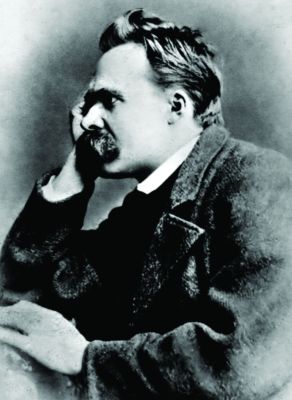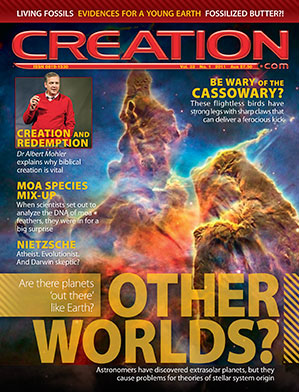Nietzsche
The evolutionist who was anti-God and anti-Darwin
German philosopher Friedrich Nietzsche (1844–1900) is probably best known for his “God is dead” pronouncement. Not so well known is the fact that although he believed in evolution, he vehemently rejected the major principles of Darwinism.1

Nietzsche and the ‘death of God’
Nietzsche proclaimed the death of God in The Gay Science2 by a parable about a madman with a lantern, looking for God, only to have his fellow citizens ridicule it:
“The madman jumped into their midst and pierced them with his eyes. ‘Whither is God?’ he cried; ‘I will tell you. We have killed him—you and I. All of us are his murderers. … God is dead. … And we have killed him.’”3,4
Nietzsche then explained that what he meant was: “the belief in the Christian god has become unbelievable”.5 His motive appears to have been to counteract the concept of future judgment—by announcing the death of the Judge! He wrote: “We deny God; in denying God we deny accountability.”6
In place of God, Nietzsche put forward his Superhuman, (German Übermensch),7 an imaginary, super-strong, amoral individual, who would overcome all opposition, as well as the need for God—because in Nietzsche’s view, God was an illusion of the mind.
Nietzsche vs Genesis
In The Anti-Christ, Nietzsche unleashed a torrent of abuse at God and the Genesis account of creation:
“Has the famous story which stands at the beginning of the Bible really been understood—the story of God’s mortal terror of science? …
“God’s first blunder: man did not find the animals entertaining—he dominated them, he did not even want to be an ‘animal’.—Consequently God created woman. And then indeed there was an end to boredom but also to something else! Woman was God’s second blunder.—‘Woman is in her essence serpent, Heva—every priest knows that, every evil comes into the world through woman’ … .”8
Perhaps the kindest comment on this is to see it as the forerunner to the insanity of Nietzsche’s last 11 years.
Nietzsche vs Darwin
Nietzsche wrote not long after Darwin. Millions of years had long been regarded as ‘fact’, and evolution was hugely popular among the intelligentsia, of whom some were still debating its mechanism. An atheist must, by definition, believe in ‘evolution’—a world that made itself—regardless of how such transformations were achieved. It is thus not surprising to see the atheist Nietzsche writing in Thus Spake Zarathustra: “You [mankind] have made your way from worm to human, and much in you is still worm. Once you were apes, and even now the human being is still more of an ape than any ape is.”9
Yet it surprises many that he vehemently opposed Darwin’s ideas as to the ‘how’ of evolution, preferring his own notion of what he called “the will to power”.
Nietzsche said Darwin was wrong in four fundamental aspects of his theory.
1. Small changes could not produce new organs.
He realized that a partly formed organ was of no survival value, and wrote:
“Against Darwinism.—The utility of an organ does not explain its origin; on the contrary! For most of the time during which a property is forming it does not preserve the individual and is of no use to him, least of all in the struggle with external circumstances and enemies.”10
Nietzsche claimed that in real life the weak survive rather than the strong. He wrote:
2. The weak outlast the strong.
“Anti-Darwin.—As regards the celebrated ‘struggle for life’, … where there is struggle it is a struggle for power … its outcome is the reverse of that desired by the school of Darwin … the weaker dominate the strong again and again—the reason being they are the great majority, and they are also cleverer. … Darwin forgot the mind.”11
3. Sexual selection not normal.
Nietzsche wrote of Darwin’s notion:
“Anti-Darwin … We almost always see males and females take advantage of any chance encounter, exhibiting no selectivity whatsoever.”12
4. Transitional forms absent.
Nietzsche wrote:
“There are no transitional forms. … Primitive creatures are said to be the ancestors of those now existing. But a look at the fauna and flora of the Tertiary merely permits us to think of an as yet unexplored country that harbors types that do not exist elsewhere, while those existing elsewhere are missing.”12 [“Tertiary” refers to one of the divisions of the ‘geologic column’, ‘dated’ after the dinosaur extinction, with its implied acceptance of vast ages of pre-human history.]
Nietzsche then gave us another lengthy section, again headed Anti-Darwin:
“Anti-Darwin.—What surprises me most when I survey the broad destinies of man is that I always see before me the opposite of that which Darwin and his school see or want to see today: selection in favor of the stronger, better-constituted, and the progress of the species. Precisely the opposite is palpable … I incline to the prejudice that the school of Darwin has been deluded everywhere … .
“That will to power in which I recognize the ultimate ground and character of all change provides us with the reason why selection is not in favor of the exceptions and lucky strokes: the strongest and most fortunate are weak when opposed by organized herd instincts, by the timidity of the weak, by the vast majority.”13
Not surprisingly, then, in his autobiography, Ecce Homo,14 Nietzsche describes as “oxen” those scholars who think that his Superhuman is a product of Darwinian evolution.15
Nietzsche, Darwin and Hitler
The supreme modern example of Nietzsche’s ‘Superhuman’, the strong man who lived by his own morality and vanquished all opposition, was Adolf Hitler. Hitler embraced both Darwinism and Nietzschean philosophy. For him, the Darwinian notion of the strong dominating the weak, was the highest good. At the same time, he considered himself to be the ‘superman’ of Nietzsche’s philosophy,16 and he also applied Nietzsche’s idea of superior individuals in seeking to persuade the German people that collectively they were the ‘master race’.
Hitler carried the ideas of Darwin and Nietzsche to a logical conclusion—an atheistic morality that resulted in the pillaging of Europe and the murder of over six million innocent civilians in the Holocaust.17
Conclusion
Nietzsche shook his fist at God, but Nietzsche is dead and God is not. So the last word belongs to God.
“The fool says in his heart there is no God” (Psalm 14:1).
“For the word of the cross is folly to those who are perishing, but to us who are being saved it is the power of God. For it is written, ‘I will destroy the wisdom of the wise, and the discernment of the discerning I will thwart’.” (1 Corinthians 1:18–19).
References and notes
- For further details of Nietzsche’s life and writings see Grigg, R., Nietzsche, the man who took on God and lost, Journal of Creation 24(1):106–112, 2010. Return to text.
- Note: “gay” as used here by Nietzsche’s translator, had the older meaning of ‘joyous’ with no reference to sexuality. Return to text.
- Nietzsche wrote his works in numbered sections (sometimes the whole of a book; sometimes chapter by chapter), thus making it easy to find a quotation in any translation or in any edition by any publisher, merely by searching the section number. We shall conform to this practice in this article. Return to text.
- The Gay Science (German: Die fröhliche Wissenschaft, 1882), section 125; trans. by W. Kaufmann, Random House, New York, 1974, p. 181. Return to text.
- Ref. 4, section 343, p. 279. Return to text.
- Nietzsche, F., Twilight of the Idols, or, How to Philosophize with a Hammer (German Götzen-Dämmerung, oder, Wie man mit dem Hammer philosophiert, 1889), chapter 6 The Four Great Errors, section 8, trans. by R.J. Hollingdale, Penguin Books, London, 1968, p. 65. Return to text.
- Introduced in his book, Thus Spoke Zarathustra: A Book for All and None (German Also sprach Zarathustra: Ein Buch für Alle und Keinen, 1883–1885), in which the fictional prophet Zarathustra presents Nietzsche’s ideas to the world. This inspired the symphonic poem of the same title by Richard Strauss (1896), best known for its opening fanfare—the theme of Stanley Kubrick’s 1968 film 2001: A Space Odyssey. Return to text.
- Nietzsche, The Anti-Christ, section 48, trans. by R.J. Hollingdale, Penguin Books, London, 1968, pp. 175–76. Return to text.
- Nietzsche, F., Thus Spake Zarathustra, Zarathustra’s Prologue section 3, trans. by G. Parkes, Oxford University Press, New York, 2005, p. 11. Return to text.
- Nietzsche, F., The Will to Power, section 647. trans. by W. Kaufman and R.J. Hollingdale, Random House, New York, 1967, p. 343. Return to text.
- Ref. 6, chapter 9, section 14, trans. by R.J. Hollingdale, pp. 86–87. Return to text.
- Ref. 10, section 684, pp. 362–363. Return to text.
- Ref. 10, section 685, p. 364. Nietzsche seems to have misunderstood Darwinian arguments to an extent, seeing ‘fitness’ as analogous to ‘strength’ rather than merely ‘the ones most fitted to survive/reproduce’. Return to text.
- Latin for ‘Behold the Man’, from the Vulgate translation of John 19:5, Pilate’s words to the mob when he presented the scourged Christ. Return to text.
- Nietzsche, F., Ecce Homo, chapter 3, section 1, trans. by W. Kaufman, Vintage Books, (Random House), New York, 1967, p. 261. Return to text.
- Shirer, William. The Rise and Fall of the Third Reich, 1959. New York: Simon & Schuster, 1990, p.101. Shirer wrote: “That in the end Hitler considered himself the superman of Nietzsche’s prophecy can not be doubted.” Return to text.
- Documented in Weikart, R., From Darwin to Hitler: Evolutionary Ethics, Eugenics, and Racism in Germany, Palgrave Macmillan, New York, USA, 2004; see review in Creation 27(4):39, 2005, creation.com/weikart. Return to text.




Readers’ comments
Comments are automatically closed 14 days after publication.